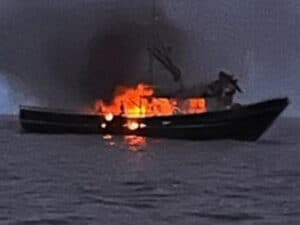
Global Maritime Forum will tackle tough industry challenges
Written by Nick Blenkey
Global Maritime Forum will succeed the Danish Maritime Forum, which over three years became recognized as the "Davos of the maritime industry."
SEPTEMBER 8, 2017 — A new Global Maritime Forum is to succeed the Danish Maritime Forum, which over three years became recognized as the “Davos of the maritime industry.”
It has been set up as an international not-for-profit organization committed to unleashing the potential of the global maritime industry to increase sustainable long term economic development and human wellbeing.
Its primary vehicle will be an annual summit which will bring together high-level leaders from across the maritime industry with policymakers, NGOs, experts and other influential decision-makers and opinion shapers to discuss industry-wide, long term challenges. It will be hosted in cities around the world on a rotational basis. The inaugural summit is expected to take place in October 2018..
“We are very pleased to announce the launch of the new Global Maritime Forum,”says Peter Stokes, Senior Advisor and Head of Shipping, Lazard, U.K., who is Chairman of Global Maritime Forum. “Our ambition is to build a platform for collaboration among the participants in global seaborne trade and to bring about positive change for the industry and for society. This will not be a new industry association, but rather a community of leaders with the breadth and quality of engagement to represent with authority the views and interests of the entire maritime spectrum,”
“As a fragmented and siloed industry in an otherwise interconnected world the maritime industry needs a shared platform to tackle collective challenges. The industry is the lifeblood of the global economy but needs to take up the challenge of leadership in its unique position to contribute to sustainable growth that benefits all,” says Paddy Rodgers, CEO of Euronav, a founding partner to the Global Maritime Forum.
“As a capital-intensive industry with protracted investment horizons, the maritime value chain requires a long term outlook. The Global Maritime Forum will provide new perspectives from inside and outside the industry to better understand the long term forces shaping our decision-making,” says Peter G. Livanos, Chairman of GasLog LTD., a founding partner to the Global Maritime Forum.
Fourteen global industry leaders are initially supporting the Forum as founding partners, including A.P. Moller-Maersk A/S, Arshiya International, Euronav, GasLog, Gorrissen Federspiel, Gulf Agency Company, Heidrick & Struggles, Hempel, KfW IPEX-Bank, MISC, the Onassis Foundation, PSA International, Trafigura and Wan Hai Lines.
In addition to its annual summit, the Forum will also serve as a broader platform for dialogue and collaboration between meetings to address global challenges that are particularly important to the maritime industry. This may include working groups and exploratory workshops to address specific industry-wide issues, recommendations for action and the like.
The first results are intended to be presented at the inaugural summit in 2018 and will include:
Decarbonizing seaborne transportation: Given the growing demand to reduce the industry’s environmental impact, the Forum will use the global platform and convening power of the Global Maritime Forum to ratchet up the industry’s level of ambition and spur faster action towards ambitious, science-based emissions reduction targets. Following the very promising working group on this topic at the Danish Maritime Forum last October, the Forum is working together with Carbon War Room, University College London (UCL) and the World Bank’s Carbon Pricing Leadership Coalition to build a global coalition of private and public stakeholders around the pillars necessary to achieve successful decarbonization and to bring forward a plan to decarbonize seaborne transport that could be presented to the industry for adoption.
Digital disruption: The aim of this initiative is to generate insights into how emerging digital technologies are transforming the global maritime industry as well as the impact of these disruptive forces on the global economy, the international trading system and on the wider society. The goal is to assist key stakeholders in the maritime industry in exploring possible responses and in uncovering opportunities for collaborative action to successfully transition to the digital economy.
The rise of protectionism: The Forum is planning a research project to look at changing seaborne trade flows against the backdrop of the threat of a retreat from globalization. The purpose is to understand how the maritime industry – either alone or in collaboration with other industries and stakeholders – could contribute to mitigating the downsides of globalization and to building support for global trade and broad-based, inclusive growth and progress.





Leave a Reply
You must be logged in to post a comment.